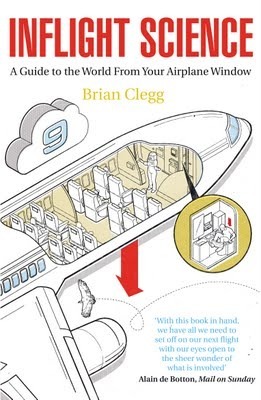Brian Clegg's Blog, page 158
September 16, 2011
Free books and moral dilemmas
 Yes, one book in the whole of the UK. And what
Yes, one book in the whole of the UK. And whata surprise, it's in London.
I was interested to read about the Guardian's attempt to get us all leaving books all over the place for other people to find. Apparently they've conned 15,000 copies out of publishers which they (what, just the Guardian staff?) are going to leave randomly about the place, and they are encouraging the rest of us to do likewise. You can even download a special bookplate to paste into your book for the purposes.
What's more there's a funky map showing where all the books have been left or found, though when I looked it only had one book on it, left by the Guardian's literary editor (Gormenghast, how... literary).
I really can't make up my mind if this is:
A very good idea that will encourage people to read moreGoing to result in lots of people (e.g. staff in a cafe where you leave a book/street cleaners) picking up books as rubbish and binning themA typical wishy-washy Guardian idea that's great fun (isn't it, Jacinda?) and totally pointlessThe trouble is, if I took part, and if I could resist giving a book I wrote away, my inclination would be to give a book I really hate. After all, the books I love I want to keep and read again. And then I would have to lie on the bookplate and sing its praises, when really I think it's total rubbish. Do these Guardian people realize the moral dilemmas they are creating?
Published on September 16, 2011 00:38
September 15, 2011
A new website is born
 Small fanfare of trumpets. I'd like to announce the arrival of a new website, www.universeinsideyou.com - like most babies, it doesn't do much at the moment. In fact it's just a placeholder really. It may gurgle occasionally, but no nappies are involved.
Small fanfare of trumpets. I'd like to announce the arrival of a new website, www.universeinsideyou.com - like most babies, it doesn't do much at the moment. In fact it's just a placeholder really. It may gurgle occasionally, but no nappies are involved.The website is for the followup to Inflight Science . The Universe Inside You uses your own body as a vehicle to explore everything from quantum theory to the workings of the brain.
The book won't be out until next April, but when it is published, like Inflight Science it will feature a range of experiments to try out. By putting some of these onto the website, they can be made more interactive and (hopefully) interesting.
The other thing the website will bring is links to find out more about other books where you can read more on a topic you've got a taster of in the book.This was something several reviews of Inflight Science said would be useful.
For the moment, though, it's just an opportunity to take a better look at the cover than the small version above. I rather like the cover - it matches the cover of the new paperback version of Inflight Science, out on 5 January, of which there's a sneak preview below:

Published on September 15, 2011 00:30
September 14, 2011
Ooh, I just had a McGurk moment
I'm currently reading for review Brain Bugs (my fingers wanted to type Brian Bugs, hmm) by Dean Buonomano. (I'll link to the review when it's available.) This is an exploration of the human brain, using the things it gets wrong as a way of understanding it better.
On mental glitch it mentions is the McGurk effect. This is well known, so you may have come across it already, but if you haven't, it's a great one. What it demonstrates is the way that the brain's processing of sensory information can result in us receiving a false impression of what's going on.
Take a look at the video below. It's important you have the sound on, as I want you to see what the guy says.
Now replay the video, but this time, close your eyes as soon as you click the replay button and listen the sound of the whole clip without the picture.
It's exactly the same video, and exactly the same sound 'Ba ba, ba ba, ba ba.' But when your eyes see the lips forming the 'Da da' sound, your brain gives more weight to your eyes than your ears and translates the electrical impulses from your ears as 'Da da' instead of 'Ba ba.' Try it watching the video again. You can't force yourself to hear 'Ba ba' even though you know that's what he is saying.
Yet another excellent example of the way our senses don't provide us with a video camera like snapshot of what is out there, but rather the brain's interpretation of what it thinks is happening. Excellent!
On mental glitch it mentions is the McGurk effect. This is well known, so you may have come across it already, but if you haven't, it's a great one. What it demonstrates is the way that the brain's processing of sensory information can result in us receiving a false impression of what's going on.
Take a look at the video below. It's important you have the sound on, as I want you to see what the guy says.
Now replay the video, but this time, close your eyes as soon as you click the replay button and listen the sound of the whole clip without the picture.
It's exactly the same video, and exactly the same sound 'Ba ba, ba ba, ba ba.' But when your eyes see the lips forming the 'Da da' sound, your brain gives more weight to your eyes than your ears and translates the electrical impulses from your ears as 'Da da' instead of 'Ba ba.' Try it watching the video again. You can't force yourself to hear 'Ba ba' even though you know that's what he is saying.
Yet another excellent example of the way our senses don't provide us with a video camera like snapshot of what is out there, but rather the brain's interpretation of what it thinks is happening. Excellent!
Published on September 14, 2011 00:59
September 13, 2011
Welcome back, Mr Galton
 Nothing to do with eugenics, but a note by Francis
Nothing to do with eugenics, but a note by FrancisGalton that messed up Eadweard Muybridge's career
I was recently reading for review Lone Frank's interesting book on gene tests and their implications, My Beautiful Genome . It makes a point that really hadn't occured to me before, raised in a discussion between Ms Frank and Armand Leroi, the author of another interesting human biology book, Mutants . And it concerns the dark side of genetics.
Many aspects of science have their dark sides. Nuclear physics - wonderful... nuclear bombs - not so wonderful. Similarly, genetics has transformed biology, but its dark side is eugenics, the brainchild of Victorian scientist Francis Galton.
Eugenics has a kind of logic, but most people find it distasteful. The idea is that genes alone should be enough to determine who will have the best children, and so you should use genes to determine who should breed and who shouldn't. (That's a vast oversimplification, but it gives a flavour.)
What Leroi pointed out to Frank is that despite the fact that eugenics is a dirty word, we operate a kind of neo-eugenics, that is generally not regarded as a problem unless it is given that loaded name. Thousands of abortions are carried out every year of fetuses that have some detected defect, physical or genetic. What is this if it's not a kind of eugenics?
I think what this illustrates is the important consideration that labels are not good ways of making decisions. 'Eugenics' as a label comes will all sorts of baggage, and at its worst, the concept is despicable. But the fact remains most people are comfortable with the process described above. Applying moral decisions to science and technology is rarely a black and white process, and should never be based on labels alone.
Published on September 13, 2011 00:12
September 12, 2011
Coming over all boustrophedon
 Awful cover - I much prefer
Awful cover - I much preferthe older oneI was reading an old Morse book at the weekend to have a break from science. Specifically Service of All the Dead. This is not my favourite of Colin Dexter's novels. The plot is ridiculously unlikely. And the attitude to homosexuality (pretty well equated with paedophilia) and women ('You're a pretty little thing,' being a commonplace and inoffensive sort of comment) seems more 1960s than 1979 when the book was written. But it did get me thinking.
Specifically, at one point Morse is searching a church and Dexter says he does this boustrophedon. My immediate reaction was to think he was showing off, and this was a classic example of using a word many people didn't know just for the sake of it. As it happens I did know what it meant. It was originally a form of writing where, having reached the end of the line, the writer starts the next line at the same end, writing the next line backwards. Then starts at the usual end again and writes forwards. And so on. The term comes from the way parallel furrows are ploughed (by an ox).
Thinking Dexter was showing off, I thought 'Why didn't he just say that Morse zig-zagged up and down the pews?' This would certainly be easier to understand. But on giving it a bit more thought, to be fair to Dexter, it's not quite the same thing. A zig-zag should be like the letter Z, with the connecting back movement at an angle. You don't do that with ploughing or writing, and you can't do that if, like Morse, you are constrained by church pews. Technically you have to go boustrophedon.
So here's the dilemma. I still think Dexter was showing off, and I still think that it's not a good idea to use words most people don't understand (and all but a tiny fraction won't bother to look up). This reduces your ability as a writer to communicate. Yet at the same time, it was, without doubt, the right word. I think maybe I would have engineered some way for Lewis to calling it zig-zagging, so Morse could correct him and introduce the proper term. But I can't really falt Colin Dexter for using the word that does the job best.
See Service of All the Dead at Amazon.co.uk and at Amazon.com

Published on September 12, 2011 00:12
September 9, 2011
Ideas and books
 I love being an author. There's very little about it (apart from writing proposals) that I don't enjoy. And one of my favourite things is talking to people about writing, science and (yes, sorry) my books. I'm happy to discuss practically anything. But there's one subject of conversation that comes up all too regularly that does make me wince just the tiniest bit. It goes something like this:
I love being an author. There's very little about it (apart from writing proposals) that I don't enjoy. And one of my favourite things is talking to people about writing, science and (yes, sorry) my books. I'm happy to discuss practically anything. But there's one subject of conversation that comes up all too regularly that does make me wince just the tiniest bit. It goes something like this:Them: 'You write books, don't you?'
Me: (Slightly embarrassed, but pleased): 'Yes.'
Them: 'I know what your next book should be about.'
Me: 'Well, actually...'
Them (Getting warmed up): 'I've got this great idea for a book, you see. You should write a book for children, make it a story, but put science in it, and...'
You get the picture. If I'm really lucky they will then say something like 'But if you use my idea, I expect my cut of the royalties!' Hmm.
The truth of the matter is that having ideas for books is really not a problem - at least I don't find it to be. I have a list of book ideas as long as your arm, tucked away on OneNote on my computer. I probably add to it about once a week. But the fact is, most of them will not get turned into books. If I am looking for a topic, on second examination, in the cold light of day, many of them will be so-so at best. Those that still do seem good will need a considerable amount of working over, then I have to sell them to a publisher (sadly, they don't leap on every idea I come up with as if it were manna from heaven), and there's also the teeny matter of writing the book.
I am quite happy with my ideas (and those of publishers, who sometimes suggest a cracker). If someone has a great idea for a book, why not write it themselves? By the time they've worked at it a couple of months, perhaps they will revise their thoughts on it. Or perhaps they will write a great book.
It's not that I don't appreciate the thought. But, really, getting great ideas is by far the easiest part of being an author. So I'm happy to hear an idea, but I'm pretty unlikely to do anything about it.
P.S. Apparently Katy Price defends the fact that she doesn't write 'her' books by saying 'But I did have some of the ideas for them!' Nuff said.
Published on September 09, 2011 00:58
September 8, 2011
Farewell incandescent light bulb, we shall miss you
 As the 60 watt bulb follows its 100 watt cousin into European illegality it's time to say a fond farewell to a light bulb that has kept our houses lit for over120 years. Admittedly the filament went from being carbon to tungsten, but this was a matter of tweaking and subtlety, not a huge change in the design.
As the 60 watt bulb follows its 100 watt cousin into European illegality it's time to say a fond farewell to a light bulb that has kept our houses lit for over120 years. Admittedly the filament went from being carbon to tungsten, but this was a matter of tweaking and subtlety, not a huge change in the design.If you ask the famous man in the street (that one, standing on the corner) who invented the electric light bulb, he would probably say Thomas Edison, as would many pub quizmasters. But they would be wrong. It's certainly true that in 1879 Edison produced an electric light bulb after much fiddling around with different filaments. And he did claim to be first on the scene, but English scientist Sir Joseph William Swan had demonstrated a bulb, like Edison's based on a carbon filament, nearly eight months earlier.
Swan, much less of a businessman, hadn't bothered with the level of patent applications that Edison had. Nor had he the same cutthroat commercial sense. Edison's reaction to the news of Swan's invention was to launch a patent infringement prosecution.
Patent law often seems to favor the commercially strong rather than the most original thinker, but in this case Swan's earlier invention was recognized by the court and Edison failed. As part of the court settlement, Edison was obliged to recognize Swan's independent and earlier invention and to set up a joint company, the Edison and Swan United Electric Light Company, to exploit the incandescent bulb.
Rumbunctious beginnings, then for the humble incandescent light bulb. But still an invention who passing we can mark with a certain sadness.
Picture from Wikipedia
Published on September 08, 2011 00:14
September 7, 2011
Light Reading
 Diamond Light Source in all its gloryIt's not surprising that as a writer who specializes in science, I'm all in favour of the intersection of science and words. This can mean the sort of non-fiction writing I do, but equally could be science fiction or the rather intriguing category lablit - fiction with a science context, but not science fiction. (Take a look at the Lablit website for a clearer idea what it's about.)
Diamond Light Source in all its gloryIt's not surprising that as a writer who specializes in science, I'm all in favour of the intersection of science and words. This can mean the sort of non-fiction writing I do, but equally could be science fiction or the rather intriguing category lablit - fiction with a science context, but not science fiction. (Take a look at the Lablit website for a clearer idea what it's about.)If you ever fancied writing either S.F. or lablit, there's a new competition called Light Reading that's just up your street. It's run by the Diamond Light Source synchrotron people, one of the UK's top physics research centres and has cash prizes from £500 downwards. What's not to love? Entries and more details at the competition website. Closing date for entries is 30 November.
If you aren't familiar with Diamond, this powerful facility generates incredibly bright light from infra-red to X-rays and is used by thousands of scientists every year to study all kinds of materials, from artificial hips and samples of the Mary Rose to virus proteins and potential new fuel sources.
Gerd Materlik, Diamond's Chief Executive, comments 'The first experiments took place here at Diamond in 2007 so we are still a relatively new science facility. Light Reading is a great way for us to highlight what Diamond is all about to a more general audience and we hope to get entries from both inside and outside the science community. Aspiring or experienced fiction writers are warmly invited to submit a story. Diamond is a really fascinating place and I'm sure the competition will lead to some brilliant stories, which I'm really looking forward to reading.'
Published on September 07, 2011 00:46
September 6, 2011
Why is it so gut-wrenching?
 The game mentioned.
The game mentioned.I still have it.I was just listening to a piece on the radio about a show that is being put together to commemorate 9/11 in the US. Listeners have been asked to select a piece of music they feel works best for such memories. By far and away the most popular choice is Samuel Barber's Adagio for Strings.
I agree absolutely, but can anyone explain why this piece is so visceral? How do a few notes, strung together in a particular way, manage to cut through the emotions so surgically? I know music always influences the emotions - there are plenty of songs that bring a smile to the face, for example. But Adagio for Strings (and for me, even more so Barber's vocal adaptation, the Agnus Dei) is unequalled in its ability to manipulate.
A long time ago (in a galaxy far, far away) one of the things I used to do to bring in the pennies was review computer games. It was as the backing track to the opening sequence of a game that I first came across this piece (back then it wasn't played on the radio anywhere near so often). The backstory of the game involved the evacuation of a planet, and as the screen showed the ship departing from a dying world, the backing track of Barber's Agnus Dei worked magnificently.
I don't know if anyone has researched it, but I'd be fascinated to know why this particular piece is so powerful.
So go on. Have a wallow:
Published on September 06, 2011 00:30
September 5, 2011
Science joke
This is an excellent joke to spot scientists in an audience. They are the ones who laugh.
A dietician, a geneticist and a physicist are arguing over how to get a horse that's good at winning races.
'It's easy,' says the dietician. 'You just feed it a carefully balanced and monitored diet.'
'No, no,' says the geneticist. 'It's all a matter of breeding for the best attributes for racing.'
'Hmm,' says the physicist. 'Let's assume the horse is a sphere...'
A dietician, a geneticist and a physicist are arguing over how to get a horse that's good at winning races.
'It's easy,' says the dietician. 'You just feed it a carefully balanced and monitored diet.'
'No, no,' says the geneticist. 'It's all a matter of breeding for the best attributes for racing.'
'Hmm,' says the physicist. 'Let's assume the horse is a sphere...'
Published on September 05, 2011 09:07



